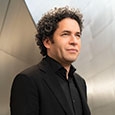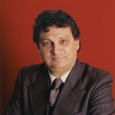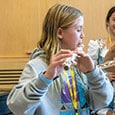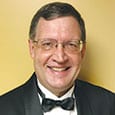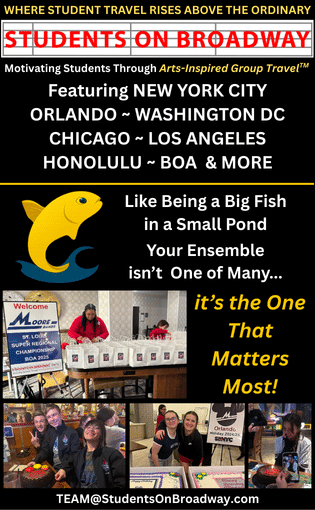Currently the Music Director of the Los Angeles Philharmonic, Gustavo Dudamel has been a tireless champion of new music and of music education. He has received many awards and international recognition for guest conducting at La Scala and the Vienna Philharmonic at the Lucerne Festival. Dudamel has conducted at the Vatican for the 80th birthday of Pope Benedict XVI, the 2016 Super Bowl, and the Vienna Philharmonic 2017 New Year’s Day concert. He made his debut at the Metropolitan Opera conducting Verdi’s Otello in 2018.
Dudamel was featured in the 2011 documentary Let The Children Play, which focuses on his work advocating for music as a way to enrich the lives of children. On January 23, 2019, his name was inscribed on the Hollywood Walk of Fame. As a young conductor of 38, Dudamel is a true star and strong musical force in today’s world.
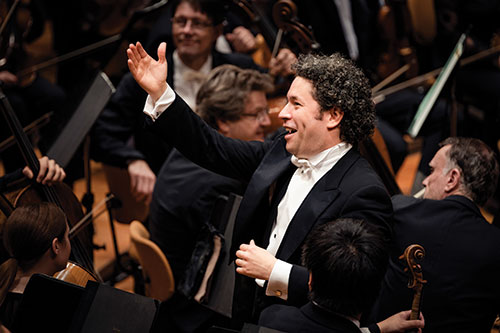
photo by Stephan Rabold
El Sistema (The System), founded in Venezuela in 1975 by José Antonio Abreu (1939-2018), is a remarkable music education program that has achieved international recognition and includes 400 music centers and 700,000 young musicians. You once said “music saved my life and has saved the lives of thousands of at-risk children in Venezuela.” Could you describe the origin and history of El Sistema and your musical beginnings and the training you received in it under Abreu’s leadership?
In Venezuela and now around the world, El Sistema promotes access to music for everyone. That is its great strength and why it offers such hope for thousands of people in hundreds of countries, from all walks of life. In my work, I, too, am always looking for ways to engage with young people and to encourage access to and participation in music.
Maestro José Antonio Abreu taught us that art is a universal right and that inspiration and beauty irreversibly transform the soul of a child. I am who I am today [because of him], and I owe it to Maestro Abreu’s generosity, humanity and vision.
Music saved my life and has saved the lives of thousands of at-risk children in Venezuela. Like food, health care, and education, music has to be a right for every citizen. Maestro Abreu saw how music has a unique power to heal society. Through El Sistema, we bring music to disadvantaged communities and create a space where children have access to beauty, art, and culture, which in turn, brings out their identity. These are the elements that build a better human being in society, and this is what Maestro Abreu created and has spread around the world.
I was born into a musical family; my father played the trombone, and he was part of El Sistema in the 1970s in my hometown of Barquisimeto. I was surrounded by music and listened to salsa and symphonic music at home and going to concerts.
After becoming involved with El Sistema you took up the violin at the age of 10, composition, and later, conducting. Was there a magic moment when you decided to become a conductor?
As a child I wanted to play the trombone, but it was too big, my arms were too short, and I didn’t have the instrument. So I tried the trumpet and then the violin. My ambition was to enjoy the world of music.
I still experience those magical moments as I did when I was a child when I’m performing with an orchestra. I’m in love with what I do.
I studied music because it was my desire. It was a great education. Maybe I would not have become a conductor without the encouragement of my parents and the guidance of Maestro Abreu. I think every child has a natural talent for music, every young person can play an instrument, learn to sing, and dance. Maybe it leads to a career, maybe it becomes a lifelong passion alongside other things; the point is that the gift of music is for everyone, not just for those like me.
You began to study conducting officially with Abreu in 1999 and later became his protégé. What essential conducting techniques and guidance did you acquire from him in your formative years at El Sistema?
Maestro Abreu was a great musician in the technique of rehearsal. He taught me the method of movement as an important element to give an artistic message language. Additionally, my philosophy of music, the way to learn, the way to structure, and the way to memorize and to put things together all came from Maestro Abreu.
You have won a number of competitions, including the Gustav Mahler Conducting Competition in Germany in 2004. What advice do you recommend to young conductors about conducting competitions and attempts to attain the attention of prominent conductors?
Take the time to learn and to develop your ideas as an artist. Competitions should be seen as an opportunity to gain experience and learn from others. The most important thing is to respect the musicians in the orchestra. You have to respect their tradition, and you learn to balance in the moment. Music has an immediate reaction that you have to be aware of. Everything can change, and you must be flexible. Conducting is psychological, and you have to inspire and guide.
What is your response to the rather common belief among conductors that the craft of conducting can be taught but that the true art of conducting cannot?
Conducting cannot be taught. My suggestion would be to learn by observing conductors and see how they work, and then pave your own way. For conductors, it’s all about understanding the dynamic of creating an interpretation with others. It is not about the gesture; it’s about inspiring and connecting with the orchestra.
I am growing every day with every composition I conduct. Conducting is a journey, not an endpoint. Every time I conduct a piece I have conducted before I learn something new and different about the piece and myself. I used to say, “How do I conduct that piece?” Now I say, “Why do I conduct it?”
What would you like to see emphasized in the training of conductors today?
The elemental education of music and harmony is necessary, but it is more important to learn to connect with and learn from musicians in your orchestra.
Do you study the interpretation of past conductors such as Toscanini, Furtwängler, or Karajan in formulating your interpretation of a master work?
Absolutely. I love to listen to music. When you listen to conductors of the past, you see that there is a specific way of interpretation. My interpretation might be different, but it is essential to listen to masterworks as a reference.
What are some common psychological and technical mistakes young conductors make when they first begin working with a professional orchestra?
Connecting with musicians is key, but understanding how to collaborate as a team should be at the core. Ego is the most dangerous trait for a young conductor.
In a rehearsal I have observed that you do not agree with the autocratic dictatorial approach. How do you encourage feedback from musicians?
I’ve been conducting orchestras for the past 10 years. We know each other well, but of course, every orchestra is different. It takes minutes to see what works and doesn’t work. The dynamic is in the moment, and then you start to build things. It is important to respect that.
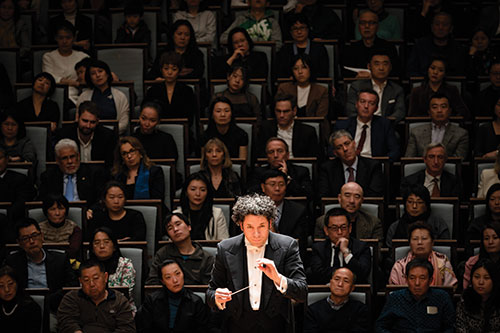
photo by Stephan Rabold
Bruno Walter once said “A musician that is only a musician is only half a musician.” By this, he meant that a conductor must develop certain sensitivities outside music. Do you recommend any studies, art, or activities for young conductors that will help in achieving this sensitivity?
I believe in learning a little about everything. I love literature, philosophy, and cooking. As humans it’s important to learn and to be inspired. It cannot just be about music. You need to cultivate yourself as a human being to bring that to the art.
As a tireless advocate of music education, why is it so important?
It is access to beauty, contemplation, and creativity. Especially when working with an orchestra, music is about teamwork. When you learn all the aspects of life and art, music is an important tool in human development, especially for a child.
home page photo by Smallz + Raskind
